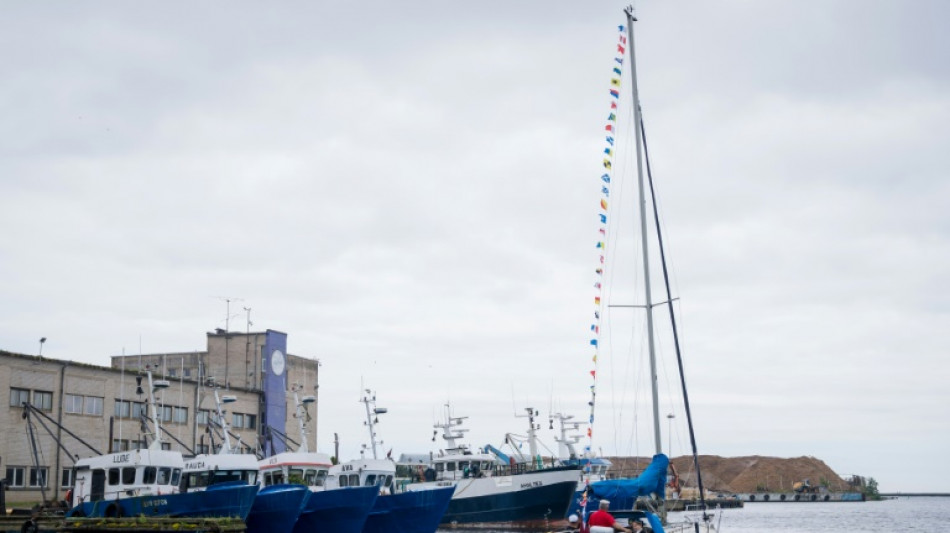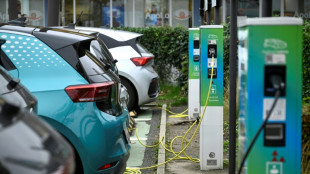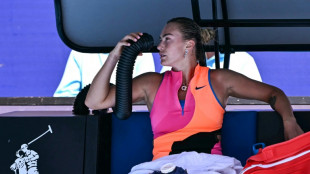
-
 Russian volcano puts on display in latest eruption
Russian volcano puts on display in latest eruption
-
Thailand uses contraceptive vaccine to limit wild elephant births

-
 Djokovic gets lucky to join Pegula, Rybakina in Melbourne semi-finals
Djokovic gets lucky to join Pegula, Rybakina in Melbourne semi-finals
-
Trump says to 'de-escalate' Minneapolis, as aide questions agents' 'protocol'

-
 'Extremely lucky' Djokovic into Melbourne semi-finals as Musetti retires
'Extremely lucky' Djokovic into Melbourne semi-finals as Musetti retires
-
'Animals in a zoo': Players back Gauff call for more privacy

-
 Starmer heads to China to defend 'pragmatic' partnership
Starmer heads to China to defend 'pragmatic' partnership
-
Uganda's Quidditch players with global dreams

-
 'Hard to survive': Kyiv's elderly shiver after Russian attacks on power and heat
'Hard to survive': Kyiv's elderly shiver after Russian attacks on power and heat
-
South Korea's ex-first lady jailed for 20 months for taking bribes

-
 Polish migrants return home to a changed country
Polish migrants return home to a changed country
-
Dutch tech giant ASML posts bumper profits, eyes bright AI future

-
 South Korea's ex-first lady jailed for 20 months for corruption
South Korea's ex-first lady jailed for 20 months for corruption
-
Minnesota congresswoman unbowed after attacked with liquid

-
 Backlash as Australia kills dingoes after backpacker death
Backlash as Australia kills dingoes after backpacker death
-
Brazil declares acai a national fruit to ward off 'biopiracy'

-
 Anisimova 'loses her mind' after Melbourne quarter-final exit
Anisimova 'loses her mind' after Melbourne quarter-final exit
-
Home hope Goggia on medal mission at Milan-Cortina Winter Olympics

-
 Omar attacked in Minneapolis after Trump vows to 'de-escalate'
Omar attacked in Minneapolis after Trump vows to 'de-escalate'
-
Pistons escape Nuggets rally, Thunder roll Pelicans

-
 Dominant Pegula sets up Australian Open semi-final against Rybakina
Dominant Pegula sets up Australian Open semi-final against Rybakina
-
'Animals in a zoo': Swiatek backs Gauff call for more privacy

-
 Japan PM's tax giveaway roils markets and worries voters
Japan PM's tax giveaway roils markets and worries voters
-
Amid Ukraine war fallout, fearful Chechen women seek escape route

-
 Rybakina surges into Melbourne semis as Djokovic takes centre stage
Rybakina surges into Melbourne semis as Djokovic takes centre stage
-
Dollar struggles to recover from losses after Trump comments

-
 Greenland blues to Delhi red carpet: EU finds solace in India
Greenland blues to Delhi red carpet: EU finds solace in India
-
Will the EU ban social media for children in 2026?

-
 Netherlands faces 'test case' climate verdict over Caribbean island
Netherlands faces 'test case' climate verdict over Caribbean island
-
Rybakina stuns Swiatek to reach Australian Open semi-finals

-
 US ouster of Maduro nightmare scenario for Kim: N. Korean ex-diplomat
US ouster of Maduro nightmare scenario for Kim: N. Korean ex-diplomat
-
Svitolina credits mental health break for reaching Melbourne semis

-
 Japan's Olympic ice icons inspire new skating generation
Japan's Olympic ice icons inspire new skating generation
-
Safe nowhere: massacre at Mexico football field sows despair

-
 North Korea to soon unveil 'next-stage' nuclear plans, Kim says
North Korea to soon unveil 'next-stage' nuclear plans, Kim says
-
French ex-senator found guilty of drugging lawmaker

-
 US Fed set to pause rate cuts as it defies Trump pressure
US Fed set to pause rate cuts as it defies Trump pressure
-
Sleeping with one eye open: Venezuelans reel from US strikes

-
 Venezuela's acting president says US unfreezing sanctioned funds
Venezuela's acting president says US unfreezing sanctioned funds
-
KPop Demon Hunters star to open Women's Asian Cup

-
 Trump warns of 'bad things' if Republicans lose midterms
Trump warns of 'bad things' if Republicans lose midterms
-
Russian strikes in Ukraine kill 12, target passenger train

-
 With Maduro gone, Venezuelan opposition figure gets back to work
With Maduro gone, Venezuelan opposition figure gets back to work
-
Celebrities call for action against US immigration raids

-
 Rubio to warn Venezuela leader of Maduro's fate if defiant
Rubio to warn Venezuela leader of Maduro's fate if defiant
-
Denver QB Nix 'predisposed' to ankle injury says coach

-
 Lula, Macron push for stronger UN to face Trump 'Board of Peace'
Lula, Macron push for stronger UN to face Trump 'Board of Peace'
-
Prass stunner helps Hoffenheim go third, Leipzig held at Pauli

-
 Swiss Meillard wins final giant slalom before Olympics
Swiss Meillard wins final giant slalom before Olympics
-
CERN chief upbeat on funding for new particle collider


Life after cod: Latvia reinvents its coastal communities
Fishers do not usually wish for a "perfect storm". But Latvian boating communities are hoping for exactly that: a rare tempest that might, one day, revive waning stocks of Baltic cod.
Decreasing salinity in the Baltic Sea is robbing the saltwater fish of the conditions it needs to thrive.
And as its population shrinks, so do the fishing traditions that have long characterised villages along Latvia's 494-kilometre (307-mile) coastline.
The result for the communities in this small EU nation is a drive to reinvent themselves, to survive.
With the European Union steadily cutting allowable catches of Baltic cod, and moving towards a total ban to replenish stocks, towns and villages are diversifying into tourism and seafood processing.
"We launched a new marina for yachting, offered services for sea travellers, and a French investor opened a brand new shipyard for yacht building," Agris Stulbergs, harbourmaster for the port in the village of Engure, explained to AFP.
Leisure boating has become a favoured activity in this village, located just 50 kilometres from the capital Riga, and others.
Farther west, in the port city of Ventspils, Juris Petersons, a lifelong seaman, reminisced how Latvian fishers used to bring in lavish hauls of fish highly valued in kitchens from Russia to Britain.
"Back in the mid-80s the Latvian fishing fleet brought in 55,000 tons of Baltic cod, in addition to salmon, herring and many other saltwater fish," he said.
Now "the environmental conditions have become so unfavourable to cod growth that Latvian fishermen are allowed to catch just 16 tonnes of cod a year," he said.
"And even that amounts only to the accidental by-catch when we fish for herring," said Petersons, an industrial fishing boat skipper until he sold off his trawlers last year.
The Baltic Sea is fed by a number of large freshwater rivers. It is connected with the North Sea only through the shallow Danish straits, preventing Atlantic saltwater from entering the Baltic basin.
- Rare storm needed -
In order to recover, the cod population would need a rare seastorm, with just the right windspeed at the correct angle to push masses of saltwater into the Baltic Sea.
That "happened at least twice during the previous century, but currently we're waiting for that perfect storm for the third decade", Petersons said.
Given the smaller yield, many in the industry have focused on quality over quantity.
"All the fish canning companies... have either gone out of business or turned their production lines into making more valuable export-grade products," said Janis Megnis, chief of the Roja port administration.
Their high quality herring and anchovy products "can be found today from Walmart in the United States to stores in Australia and Japan", he said.
Political changes have also affected the industry.
Historically Latvia's fish processing industry mainly served markets in Russia and Belarus.
But with the Russian annexation of Crimea in 2014, followed by Moscow's invasion of Ukraine in 2022, and the resulting Western sanctions, Latvian fishing companies have been forced to seek other markets.
The biggest importers today are Canada, Ukraine, Poland, Romania, Denmark and the UK, according to the agriculture ministry.
New markets include Arab countries and South Africa.
- Tourists courted -
Many families in Latvia's coastal towns have also turned their former fisheries into guesthouses and vacation destinations or switched from selling raw fish to the more lucrative smoked, prepared and spiced varieties.
"My husband is a fifth-generation fisherman: he goes out to sea for fish, which we then smoke and turn into high-end products," said Iveta Celkarte, who runs a fishing estate in Berzciems village.
"We also have a family cafe... serving our own seafood," said Celkarte, who has also become a television and social media personality.
Celkarte offers three-hour tours about the history of traditional fishing, taking visitors on a stroll through dunes to the shore and finishing with a special meal.
"For me it is important to tell people about the traditions of our coast, the history of fishing and the life of previous generations working on the sea" she said.
Aivars Lembergs, a former mayor of Ventspils, said he began turning his city into a manufacturing hub and developing tourism has been key, and is paying off.
The city is seeing many tourists coming in from neighbouring Lithuania.
"During summers you'll sometimes see more Lithuanians on the streets of Ventspils than Latvians, as Lithuania has a very short Baltic coastline, and their tourists come here to enjoy the short Baltic summer," said Lembergs, who was mayor between 1988 and 2021.
N.Schaad--VB



